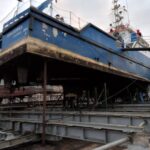Sri Lanka is first and foremost an island. As with most islands, Sri Lanka too can bear over 90% of the country’s upkeep via its treasure trove of ocean resources. One of the greatest income generators for the country was tourism, until the COVID-19 pandemic hit on a global scale, upending many economies, and it was no different in Sri Lanka. However, as the situation in the country and the world is coming back to a manageable scale, countries must do everything in their power to boost their economies.
This also means it is important for the country to come up with new and innovative ways in which to boost tourism as well as to focus on development as a whole. The upcoming tourism industry in Sri Lanka will soon require more pleasure boats and sailboats for sea excursions and other tourist activities such as whale watching, snorkelling, leisure fishing and scuba diving.
In the Wake of a Pandemic
In the very recent past, a series of webinars were held by the Commercial Division of the Embassy of Sri Lanka in the Republic of Korea to promote economic, investment and commercial activity, encourage foreign direct investments (FDIs) and international joint ventures. The main purpose of these webinars was to boost Sri Lankan Economy in the wake of the COVID-19 pandemic.
One such webinar was conducted by the Embassy in Seoul and the Korea Medium and Small Shipbuilding Industry Cooperative (KOMSSIC) and the Sri Lanka Boat Building Industry mainly because Sri Lanka is a country with the capacity and technical know-how in the ship and boat building industry for several decades.
At the webinar Ambassador Dr A. Saj U. Mendis stated that this particular sector has a “distinct advantage to become a hub in the entire Asian region due to its strategic location, highly trainable and adaptable workforce, state-of-the-art technology, proven expertise and advantage of the cost of labour, amongst others”.
Boat Building Strategy in Sri Lanka
In 2018, the Boat Building Strategy for 2018-2022 was released as part of the National Export Strategy (NES) of Sri Lanka, under the aegis of the Ministry of Development Strategies and International Trade (MoDSIT) and the Sri Lanka Export Development Board (EDB).
Neil Fernando, the Chairman of the Boat Building Technology Improvement institute stated in the report that “the National Export Strategy has identified boat building, a visionary sector, as a priority sector for growth and development over the next five years. The NES focus on boat and shipbuilding will establish this sector to benefit well from the demand for a regional boat and shipbuilding hub in Asia. This will lead Sri Lanka towards its aspirations to become a hub of growth & innovation in the Asian region, and thereby providing employment and prosperity to thousands of Sri Lankans.”
Although the strategy was released before the pandemic, the opportunities still remain the same.
According to the report, boating tourism represents a major untapped opportunity for Sri Lanka’s national economy. The country’s coasts and sea/weather conditions make the island an excellent charter destination, with the possible expansion of boating and sailing tourism and marina services provision. Investment through public-private partnerships to install basic marina facilities will enable marina operators and charter companies to provide services around the island for visiting yachts and recreational craft. Boating tourism development will spur a variety of subsectors, namely water sports rental, inland boat hire, sailing schools and training and whale and dolphin watching.
However, the report stated that the industry faces constraints that need to be addressed in the short-to-medium term to facilitate rapid industry growth. Updating regulatory framework, providing marketing and promotional support, expanding the existing capacity of boatyards and dockyards and improving overall industry coordination will create an enabling environment for the development of the boating industry.
The boat and shipbuilding industry is a high-value industry on a global scale. However, Sri Lanka can easily compete with international standards by adapting an advanced technical capacity and stellar expertise that is readily available within the island. The demand for ships and boats has also increased in the recent past with the increase of oceanic traffic in the Indian Ocean. This in turn has increased the requirements for boat and ship repairing and ancillary services.
Thus, the potential for Sri Lanka’s boat and shipbuilding industry is great.







Leave a Reply